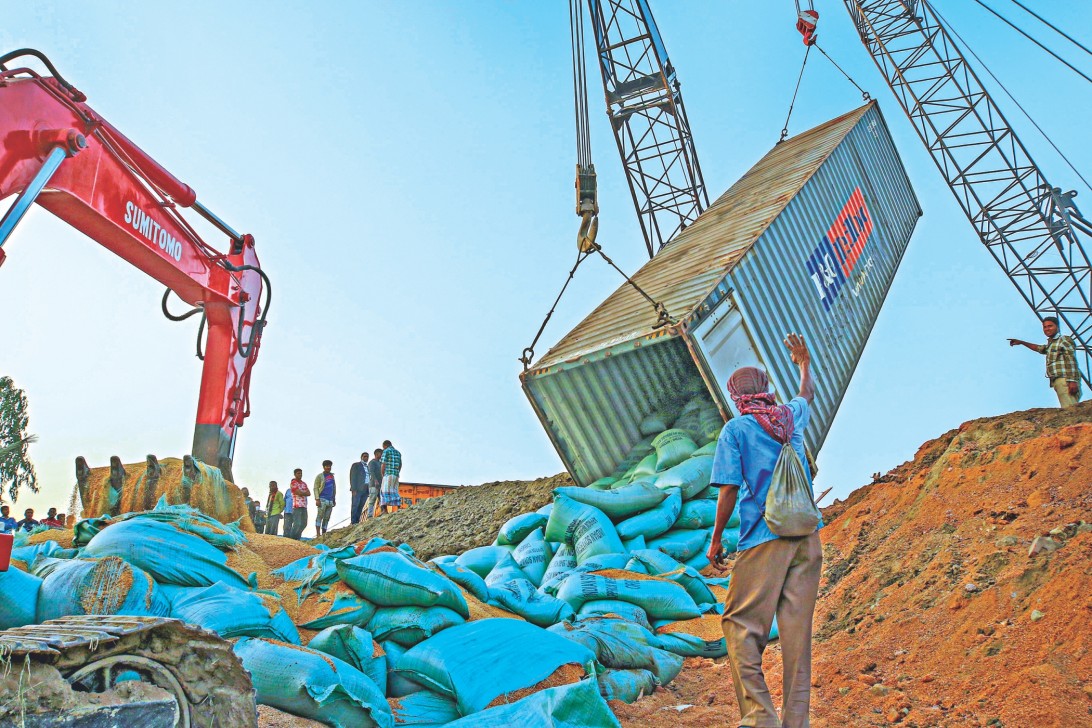Lengthy auction process costs govt crores

Unclaimed goods worth crores of taka rot away every year at the Chattogram port for the customs authority’s lengthy auction process that takes six to 12 months.
The practice is not only causing wastage but is also causing higher imports.
For instance, the customs authority is set to destroy about 5,000 tonnes of onion, apple, orange, tangerine, meat, fish and animal feed, sanitary napkin, hybrid corn seed, energy drink, shrimp and several chemicals products worth Tk 25 crore that were brought by 50 importers between 2008 and 2018.
Were those goods auctioned off within 30 days of arrival of the consignment at the port, as per the Customs Act 1969, the government could have not only earned a hefty sum but their import demand would have been less too.
Importers tend to abandon consignments due to: fall in prices of the goods in the local market; failure to submit original documents in support of the shipment and get clearance permit reports; and importers’ refusal to pay fines for anomalies, according to custom officials and importers.
In the last three years, less than one percent of the abandoned goods, worth Tk 10,000 crore, could be auctioned off, as per customs data. The process fetched Tk 145 crore.
A total of 269 containers of imported goods worth Tk 78 crore expired and had to be disposed of by either burning or burying. As many as 6,780 import consignments worth Tk 9,980 crore were abandoned between July 2013 and August 2019, according to Chattogram Port and customs data.
Delivery of the consignments would have earned the government Tk 7,000 crore in customs duty as per the data.
“It is not possible to estimate how much revenue is being lost without opening the containers,” said Majedul Haque, deputy commissioner at the Chattogram Customs House (CCH), who is also in-charge of auctions.
Cost of dumping
Although the CCH is supposed to bear the dumping cost, shipping agents, who are the local representatives of container owners, do so to empty the containers and rent them out again.
Dumping costs Tk 1 lakh to Tk 1.2 lakh per container as the goods need to be inspected and permissions are needed from different bodies including city corporations, Atomic Energy Commission and Department of Environment, said Ahsanul Haque Chowdhury, president of the Bangladesh Shipping Agent Association.
Since the auctions were not done timely, the shipping agents could neither use the containers for other consignments nor send them back to the owning companies abroad, he said.
“This is spoiling the image of Bangladesh,” he said, adding that many container owners are unwilling to provide containers for Bangladesh-bound goods and charges Bangladeshi importers more.
A container can be rented out 10 times in a year and a shipping agent loses at least $20,000 when a container gets stuck at any port, said Shahed Sarwer, director of K Line Shipping.
Apart from lost revenue, shipping agents also have to pay electricity bills to the port authority for the refrigerated containers.
Port activities hampered
Unclaimed goods stuffed in containers occupy 15 percent of the port yard, leaving insufficient space for emergency loading and offloading operations from ships and other regular activities, said Md Omar Faruq, secretary to the Chattogram port.
The port has the capacity to house 48,000 TEUs (twenty equivalent units) of containers, of which more than 6,000 are unclaimed goods containers, he said.
A container with imported goods can be kept free of cost for four days from its arrival at the port.
After that, importers have to pay a daily charge of $6 for 20 feet containers and $12 for 40 feet containers in the first week. The charge doubles in the second and third week until importers take delivery.
Therefore, abandoned goods costs about Tk 2 crore in lost revenue per day, Faruq added.
Lengthy Auction Process
The auction process could not be accelerated because of a shortage of manpower and equipment needed to take inventory of the goods and open, move and sort out the containers, said Fakhrul Alam, commissioner of CCH.
Only 12 officials work at the auction section, but recently 80 customs officials from other departments have been deputed for two days a week in rotation.
The limited number of bidders in the auctions also delay the process, said CCH officials.
Customs procedures discourage sale of non-perishable goods below its reserve value, which is 60 percent of the import price plus tax, in the first auction.
In the second auction, the bidding price is expected to be higher than what the highest bidder offered in the first auction. In the third auction, the item is sold to the highest bidder.
Although the reserve price of an item is not disclosed, it is somehow leaked and the bidders who take part in the open tender issued by the customs authority wait until the third auction to buy the good, CCH officials said.
In many cases, an item is sold at 10 to 15 percent of its market value in the third auction, according to Haque.
Mahbubul Alam, president of the Chattogram Chamber of Commerce and Industry (CCCI), called for making the auction process simpler.
The CCCI has sent letters several times to the National Board of Revenue and customs to run e-tender programme for auction and form a taskforce committee with involvement of all related departments to speed up the auction procedure.
“But those recommendations are yet to be implemented,” Alam said.
If e-tender was implemented, the auction process would become easier and attract participation of more bidders, which might help reduce the number of undelivered containers, said customs officials.
The initiative to launch an e-tender programme was taken in 2015 but got stalled.
